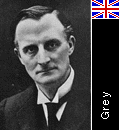
 Grey, Sir Edward, 3rd Baronet, Viscount of Fallodon. (1862-1933).
Born, London. Liberal Secretary of State, Foreign Affairs.
Grey, Sir Edward, 3rd Baronet, Viscount of Fallodon. (1862-1933).
Born, London. Liberal Secretary of State, Foreign Affairs.
An Oxford graduate and an accomplished athlete, Edward Grey regained a seat in parliament for the Liberal Party from Berwick-on-Tweed in 1885 and retained that seat until his elevation to the House of Lords as Viscount Grey of Fallodon in 1916. In 1892 he became Under Secretary for Foreign Affairs in the last government headed by William E. Gladstone. Grey served in the opposition following the Tory victory of 1895 but spoke in support of the rapprochement struck with France by Lord Salisbury's regime in 1904, because Grey had grown concerned over Britain's isolation in the Boer War and over Germany's burgeoning power. Upon the Liberals' return to power under Henry Campbell-Bannerman in 1905, Grey became Secretary for Foreign Affairs and, as an Imperialist Liberal of the Herbert H. Asquith faction of the party, Grey continued to strengthen the Anglo-French Entente, under the prime ministries of Campell-Bannerman and Asquith (1905-16). The ensuing extension of the Entente was the army reform of R. B. Haldane and the creation of the British Expeditionary Force that responded quickly to the events of August 1914.
The Entente grew stronger over the years, because of its nurturing by Grey and by staff-level military contingency plans between the British and the French, as well as by Britain's solid support of France during the Moroccan Crises in 1906 and 1911. Meanwhile, Grey undertook to achieve an entente with Russia, which he secured in 1907 and which complemented the Franco-Russian Alliance and the Anglo-French Entente. Relationships with the two Entente partners were strengthened further by naval understandings reached prior to the outbreak of hostilities in 1914. None of this activity, however, obligated Great Britain to engage in warfare. If only because of the sharp division of the British Cabinet over the country's involvement on the Continent, Grey retained freedom of action on behalf of his government.
As the assassination of Austro-Hungarian Archduke Franz Ferdinand placed Europe on a course for war, Edward Grey strove to maintain the peace. As in the 1908 and 1913 Balkan crises, he called for a conference to resolve the problems, but Grey received no support from Germany, the necessary partner in such an effort. In something of a repetition of his caution to Germany during the first Moroccan Crisis in 1906, Grey intimated to German Chancellor Theobold von Bethmann-Hollweg that Great Britain could not guarantee its neutrality in a German war against France. However, neither could Grey promise the French and Russians that Great Britain would side with them, because of the divided cabinet. Grey did, however, hint broadly to his Cabinet colleagues that if they chose to remain neutral in the coming war, he would resign. Nonetheless, only a German violation of Belgian neutrality would win the approval of the Asquith cabinet for war. Germany did not disappoint the British interventionists.
Once war erupted, Grey worked hard for victory. In September the Triple Entente became in effect an alliance through the agreement of Britain, France, and Russia that none of them would conclude a separate peace with the enemy. Seven months later, Grey completed negotiations with Italy in the Pact of London of April 1915 and thus secured Italian entry into the war on the side of the Entente. While Italy's entry did not, as expected, win the war for the Entente, the intervention probably saved the Entente from defeat in the wake of the collapse of the Russian Army in May 1915. The secret treaties and agreements made during the war were later to be castigated by Grey's critics, but Grey managed thereby to hold the Entente and Italy together through very difficult times. On the other side of the ledger, Grey emerged in 1915 as one of the earliest first-rank supporters of a League of Nations as a means of keeping the peace in the future, and he strove successfully to maintain friendly relations with neutral countries, especially the United States.
When the Asquith government fell in December 1916 and was succeeded by that of David Lloyd George, Grey retired from office - exactly eleven years after he had assumed leadership of the Foreign Office. Raised to the House of Lords by King George, Grey served as Liberal leader in that chamber, 1923-24, but not before he had conducted a special ambassadorial mission to the United States, 1919-20, in the vain hope - vain, owing to Woodrow Wilson's collapse -- of negotiating an agreement with the Wilson Administration concerning the League of Nations. In his post-war memoir, Twenty-five Years (1925), Grey hypothesized that an Anglo-American-German alliance could guarantee the peace for the foreseeable future; and, in his several books on the recreational activities that helped to sustain him through stressful years in office, Grey revealed another side of himself altogether.
 JY
JY
Further Reading:
H. Hinsley, ed., British Foreign Policy under Sir Edward Grey. Cambridge: Cambridge University Press, 1977.
Hermann Lutz, Lord Grey and the World War, tr. E. W. Dickes New York: Alfred A. Knopf, 1928.
Max Montglas, British Foreign Policy under Sir Edward Grey, tr. William C. Dreher. New York: Alfred A. Knopf, 1928.
Gilbert Murray, The Foreign Policy of Sir Edward Grey, 1906-1915. Oxford: The Clarendon Press, 1915.
Keith Robbins, Edward Grey. London: Casell, 1971.
George M. Trevelyan, Grey of Fallodon. Boston: Houghton Mifflin Co, 1937.
Edward Grey, Twenty-five Years, 1892-1916. 2 vols; New York: Frederick A. Stokes, 1925.
Cedric J. Lowe and Michael L. Dockrill, The Mirage of Power: British Foreign Policy, 1902-1922. 3 vols.; London: Routledge and Kegan Paul, 1972.
Edward Grey, Recreation. Boston: Houghton Mifflin Co., 1920.
Edward Grey, The Fallodon Papers. Boston: Houghton Mifflin Co., 1926.
Edward Grey, Fly-Fishing. London: Dent and Sons, 1899.
Edward Grey, The Charm of Birds. New York: Frederick A. Stokes, 1927.
Return to Names List